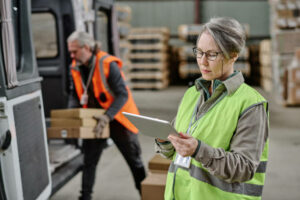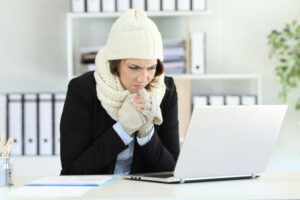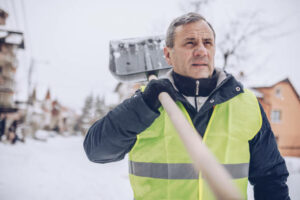The Health and Safety Executive (HSE) is providing employers with tailored seasonal guidance for protecting workers during the winter months.
 Britain’s health and safety watchdog is addressing health and safety risks for seasonal and temporary workers, lone workers, preventing slips, trips and falls on icy surfaces, working in low temperatures, and preventing manual handling injuries for busy sectors.
Britain’s health and safety watchdog is addressing health and safety risks for seasonal and temporary workers, lone workers, preventing slips, trips and falls on icy surfaces, working in low temperatures, and preventing manual handling injuries for busy sectors.
The HSE has highlighted the importance of protecting the health, safety and welfare of all workers, and urged employers to be especially aware of seasonal hazards and risks.
Health and safety for gig economy and temporary workers
 Firstly, the watchdog has explained: “With many seasonal jobs available at this time of year, employers must prioritise the health and safety of gig economy, agency and temporary workers.”
Firstly, the watchdog has explained: “With many seasonal jobs available at this time of year, employers must prioritise the health and safety of gig economy, agency and temporary workers.”
They point out that, statistically, a worker is as likely to experience an accident at work within their first 6 months at a workplace as they are over the rest of their working life. This is due to factors such as a lack of experience, being unfamiliar with the job role and the workplace environment, feeling unable to raise concerns or not knowing how to, and an eagerness to impress new colleagues and managers.
This means employers need to be especially conscious of protecting workers who are new to the job, including temporary workers engaged for the festive season. The HSE outlines 6 ways to protect new workers.
They also provide specific guidance for protecting the health and safety of gig economy, agency and temporary workers. This includes sector-specific guidance for industries such as catering and hospitality, which can be particularly busy at this time of year and may recruit additional workers.
The watchdog also wants to ensure that agency and temporary workers understand that their health and safety at work is protected by law and that they are entitled to work in an environment where health and safety risks have been assessed and properly controlled.
Preventing slips, trips and falls in winter weather
 The HSE also advises that, at this time of year, darker evenings and colder weather can result in more frequent slips, trips and falls at work.
The HSE also advises that, at this time of year, darker evenings and colder weather can result in more frequent slips, trips and falls at work.
In fact, slips, trips and falls are responsible for over a third of all major workplace injuries and can also lead to other types of serious accidents, such as falls from height or into machinery.
The winter months can see a range of environmental factors converging to increase the risk of falls. Employers need to consider the risks from things like poor lighting, rain, frost, decaying leaves and condensation, and implement suitable measures to reduce them, such as:
- Ensuring walkways are free from obstructions and have an even surface
- Ensuring workplace areas, including outside areas and staircases, are well-lit
- Installing features such as canopies over entrances to reduce the risk from rainwater on smooth surfaces
- Gritting outside surfaces to mitigate risks from frost and ice
- Monitoring workplace temperatures
The HSE provides more general guidance on the simple steps that employers can take to prevent slips, trips and falls as well as specific guidance for icy conditions and winter weather.
Health and safety risks in busy sectors
As we approach the festive season, Britain’s health and safety watchdog is also particularly appealing to employers in the haulage and distribution industry to focus on the health and safety of their workforce.
 The lead-up to Christmas is one of the busiest times of year for this sector, with increased demands on workers often resulting in an increased risk of injury.
The lead-up to Christmas is one of the busiest times of year for this sector, with increased demands on workers often resulting in an increased risk of injury.
A key hazard for workers in haulage and distribution, especially at this time of year, is manual handling.
Employers have a legal duty to protect workers from the risks of manual handling injuries at work at all times of year and should implement suitable control measures to prevent such injuries.
The HSE provides a range of useful information and guidance on manual handling, including assessing manual handling risks and providing suitable training for workers. They also have dedicated publications for manual handling at work.
Protecting the health and safety of lone workers
Throughout the year, health and safety risks can be greater for those working alone, as they may not have anyone to support them if work activities go wrong.
However, during the colder and darker months, these risks can be amplified.
The HSE says that employers should provide targeted training, supervision, monitoring and support for lone workers.
They provide a free, downloadable resource for anyone who employs lone workers or engages them as contractors, including those who are self-employed or work alone.
In addition, their lone working guidance pages provide useful information and advice about topics such as training, supervision and monitoring, stress and other health factors, and the risk of violence. Their lone workers video can provide further guidance.
Working safely in cold temperatures
 As the temperature drops, employers in all sectors may also want to consult the HSE’s guidance on temperature in the workplace.
As the temperature drops, employers in all sectors may also want to consult the HSE’s guidance on temperature in the workplace.
The law sets out minimum temperatures for indoor workplaces and employers should take practical steps to protect workers and keep them comfortable when working in the cold. This includes measures such as:
- Adequate workplace heating, such as portable heaters, to maintain comfortable temperatures in work areas
- Processes that minimise exposure to cold areas or cold products
- Reduction of draughts while maintaining adequate ventilation
- Insulating floor coverings or special footwear for those working on cold floors
- Appropriate protective clothing for cold environments
Providing workers with flexible working patterns or job rotation and sufficient breaks to enable them to get hot drinks or warm up in heated areas can also help limit exposure to cold temperatures and mitigate the risks.
The HSE also provides information about cold stress and advice for workers about maintaining comfortable temperatures while they work.
Targeted health and safety training and support for the workplace
First Response Training (FRT) is one of the UK’s largest and leading national training providers.
 They deliver a wide and diverse range of training for businesses and organisations across all industry sectors and throughout the UK. Their course range includes training in the fields of health and safety, first aid, fire safety, manual handling, mental health, food safety, health and social care and more.
They deliver a wide and diverse range of training for businesses and organisations across all industry sectors and throughout the UK. Their course range includes training in the fields of health and safety, first aid, fire safety, manual handling, mental health, food safety, health and social care and more.
Their health and safety training range includes Principles of Health and Safety, Manual Handling, Lone Working, Accident and Incident Investigation, Principles of Risk Assessment and Working at Height.
These courses are mapped to UK standards and legislation and follow HSE guidelines.
Based on a common sense, proportionate approach to workplace safety, training helps learners to understand the true benefits of creating a healthy and safe environment at work.
A trainer from FRT explains:
“We believe in creating safer working environments with people who care, and know that when workers feel safe, valued and protected, they are likely to be happier and more productive at work.
“Companies with a strong health and safety ethos can not only reduce workplace accidents and downtime, but also see better staff retention rates and increased employee satisfaction in the future.
“Health and safety training can help employers understand their responsibility to assess risks to workers, consult with workers on control measures to reduce those risks, and implement those measures. This applies to measures to maintain a comfortable, safe temperature for all workers as well as many other seasonal and ongoing health and safety factors.”
For more information on any of the training courses that FRT can provide, please call them today on freephone 0800 310 2300 or e-mail info@firstresponsetraining.com.
